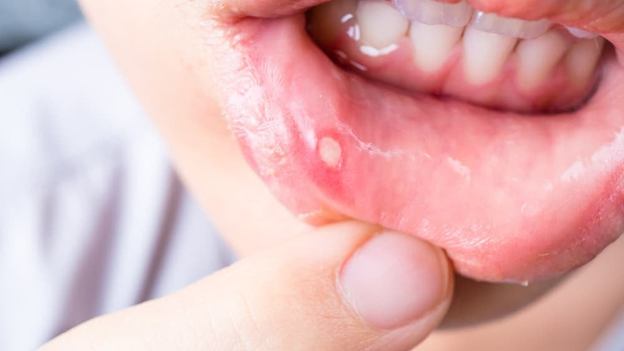Mouth ulcers are small, painful sores inside your mouth. Almost everyone gets them at some point. They’re common and usually harmless, but they can be annoying. Understanding mouth ulcers is important as it helps in faster, better management. Did you know that some causes are avoidable? Being informed can guide you in better care.

Understanding Mouth Ulcers: Causes and Symptoms
Mouth ulcers are tiny sores that appear inside the mouth. They can be white, red, or yellow. They often make eating, drinking, and talking uncomfortable. But what causes them?
Here are some common causes of mouth ulcers:
- Stress: Emotional stress can trigger these sores.
- Diet: Spicy foods and acidic drinks can irritate your mouth.
- Injuries: Biting your lip or brushing too hard can lead to sores.
- Health Conditions: Sometimes, they signal an underlying health problem, like a digestive issue.
These ulcers can also result from not getting enough nutrients like Vitamin B or iron. Allergies, too, can play a role in developing mouth ulcers. Knowing these causes helps you manage or even prevent them.
Types and Differences: Keeping Mouth Ulcers and Cold Sores Apart
Mouth ulcers aren’t all the same. Here’s a quick breakdown:
- Minor ulcers: These make up the bulk of cases. They’re small and heal fast.
- Major ulcers: These are larger and may cause scarring.
- Herpetiform ulcers: Tiny but many in number, appearing like clusters.
Don’t confuse mouth ulcers with cold sores. Cold sores are caused by a virus and appear outside the mouth, mainly on the lips. Understanding the difference is key to treating them properly.
Both mouth ulcers and cold sores have things that can influence them—like your genes, where you live, and your lifestyle, like the foods you eat.
When to Seek Medical Attention for Mouth Ulcers
Most mouth ulcers go away on their own. But when should you see a doctor? Here are a few indicators to watch for:
- Lasting over 2 weeks: Consider a professional evaluation.
- Recurrence: Frequent sores may need a doctor’s advice.
- Other Symptoms: Fever or unusual patterns could hint at a serious issue.
Sometimes, mouth ulcers can signal a more serious condition, like oral cancer. That’s why it’s crucial to see a doctor if they last long or cause concern. Sehat Hospitals has experts to handle complex cases.
Effective Management and Treatment Options for Mouth Ulcers
Dealing with mouth ulcers can be simple with the right steps. Try these home remedies:
- Saltwater rinses: They clean the sore area, aiding healing.
- Pain-relieving gels: Found over the counter; they ease discomfort.
For stubborn cases, Sehat Hospitals offers treatments:
- Medical Treatments: Prescription pills or medicated mouthwashes.
- Lifestyle Modifications: Guidance on preventing future sores.
Preventing mouth ulcers can be as simple as maintaining good oral hygiene and managing stress better.
Conclusion: Ensuring Oral Health and Well-being
Most mouth ulcers are nothing to worry about. They usually heal up soon. Still, keep your mouth clean and see a doctor when needed. If uncertain or problems persist, reach out to Sehat Hospitals. They provide excellent care and management. Prioritize oral health to prevent these pesky sores.

